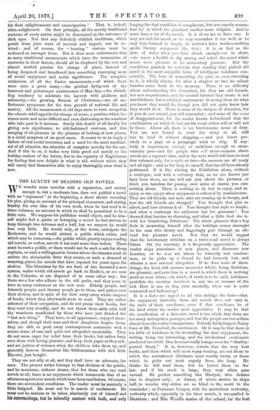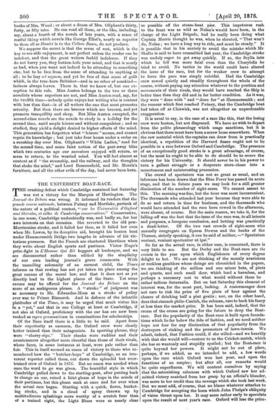THE LUXURY OF READING OLD NOVELS.
WE wonder some novelist with a reputation, and money enough to risk a moderate loss, does not publish a novel with an " argument " at the beginning, a short sketch revealing his plot, giving an account of his principal characters, and stating frankly his own idea of his own work, when he had read it in three volumes, an account in which he shall be permitted to be a little vain. We suppose his publisher would object, and he him- self might feel a qualm at betraying a secret he had striven to keep through two volumes and a half, but we suspect he would lose very little. He would only, at the worst, anticipate the Reviewers, and he would attract a public which exists, and which may be numerous,—the public which greatly enjoys reading old novels, or rather, novels it has read some time before. There must be such a public, or there would not be such a sale for cheap reprints, or such a willingness in houses where the inmates read, to endure the abominable litter they create, or such a demand at watering-places for novels that have reposed for years upon the shelves. The librarians by the sea have of late invented a new system, under which old novels go back to Mudie's, or are sent to the Colonies, or are disposed of in some other way ; but there are a few who adhere to the old paths, and they seem to have as many customers as the new men. Elderly people, and leisurely people, and literary people go to them, and potter over their shelves, and in spite of the dust carry away whole cargoes of books, which they afterwards seem to read. They are rather ashamed of their occupation, and do not praise their books, but they read very steadily, and do not throw them aside with half the weariness manifested by those who have just finished the "last new thing." They have, to all appearance, enjoyed them- selves, and though their sons and their daughters despise them, they are able to push away contemptuous comments with a serene sense of ease and quiet not altogether unenviable. They do not seem eager for relief from their books, but rather hang over them with loving pleasure, and keep their pages as they talk, and are jealous of volumes when the children take them up, and generally beseem themselves like bibliomaniacs with rich little Elzevirs, just bought.
They are not silly at all, and they shall have an advocate, for once. The present writer belongs to that division of the public, and he maintains, without shame, that for those who can read novels at all, there is no enjoyment which transcends that of an afternoon spent over novels which have been read before. Of course, there are antecedent conditions. The reader must be mentally a little fatigued. Re must not be in search of excitement. He must not be anxious to be taken absolutely out of himself and his surratuldings, but be tolerably content with both, and only
longing for that condition of complacent, but not exactly somno- lent kef in which the practised smoker most delights. And he must have a lot of the novels. It is of no use to have one. It may not suit hi mood, or be may remember it too well, or he may have learned to despise its author's later works—nothing spoils literary enjoyment like that ; it is as bad as the taste of water when you have drunk enough—or in short, —he wants a boxfbl, to dip among and select the novel which seems most pleasant in its momentary promise. But the conditions granted, we maintain that reading that picked old novel is the most enjoyable form of intelligent indolence con- ceivable. The bore of unravelling the plot, or even attending to it, is wholly absent, for after a chapter or two its salient features come back to the memory. There is no difficulty about understanding the characters, for they are old friends, not new acquaintance, and the mental interest they create is not watchfulness, but a subdued amusement in seeing them do what you knew they would do, though you did not quite know how they would do it. There is none of the fatigue of attention, for if you do not attend, you still remember ; and none of the ennui of disappointment, for the reader knows beforehand that the combination on which be had setrbis heart either will or will not be there. Above all, there is no burdensome sense of duty. You are not bound to read the story at all, still less to read it without skipping, — and you know pre- cisely to a page or a paragraph what to skip. If any- body is impertinent enough or malicious enough to cross- examine you—and the people who will cross-examine about novels are a separate class, and in the next world will have to read first volumes only, for a cycle or two—the answers are all ready and all right ; and as for duty to oneself, that has all been already performed. It is like visiting the Exhibition alone, without a catalogue, and with a certainty that, as no one knows you have been there, no one will ask you about the pictures, or think you tasteless for passing over acres of canvas you care nothing about. There is nothing to do but to enjoy, and to enjoy as one enjoys when enjoyment is softened by reminiscence. They are old friends, not new, who are coming up in troops, and how the old friends are changed ! You thought that plot so adroit, and how obvious it is! You thought that style so simple, and what a contempt the authoress has for grammar 1 You deemed that heroine so charming, and what a little fool she is, with her blundering flirtations! The whole pleasure that a boy feels in measuring himself after the holidays comes unsought to the man who slowly and lingeringly gets through an oft-
read but pleasant novel. Not that we would suggest that the involuntary criticism on a twice-read novel is always bitter. On the contrary, it is frequently appreciative. The reader skips sometimes at new places, and discovers new beauties, or he sees art where he formerly saw careless- ness, or be picks up a thread he had formerly lost, and obtains a new interest altogether. If he does none of these things, the book still arouses memories which, being fictitious, are pleasant, and puts him in a mood in which there is nothing acrid or even bitter,—in which, if truth is to be said, indolence prohibits the exertion involved in any use or menace of the rod. How is one to flog even mentally, when one is quite contented and half-asleep ?
It is a fact—we appeal to all who indulge the taste—that the enjoyment derivable from old novels does not vary in the ratio of their excellence, even if that excellence be of the kind which the reader most appreciates. It may be that the recollection of a first-rate novel is too vivid, that there are too many unforgotten passages, and that the people are too seldom absent from the reader's imagination. Nobody fairly forgets Nancy Cass or Mr. Trumbull, the auctioneer. Or it may be that there is too little of indolence in the re-reading for true enjoyment, the writing being too interesting, and the intellectual excitement produced too vivid. One does not really lounge over the "Shabby- genteel Story." It is, however, certain that the very best books, and those which will most repay reading, are not those to which the reminiscent dilettante most readily turns, or those which be picks out most eagerly from the heap. He thinks he will read them, but he leaves them to the last, and if his stock is large, they very often pass unread. He prefers something like Marryat, who detains him in chapters only ; or James, of whose stories be skips half, to wonder why critics are so blind to the merit in the remainder ; or Fenimore Cooper, with his marvellous verbosity,. verbosity which, especially in his later novels, is unequalled in literature ; and Mrs. Wood's stories of that school, far the beat books of Mrs. Wood ; or about a dozen of Mrs. Oliphant's thirty, forty, or fifty tales. He can read all these, or the like, including, say, about a fourth of the novels of late years, with a sense of restful liking which novels like George Eliot's, nearly EIS superior to them all as Hamlet is to the Colleen Bairn, do not produce.
We suppose the secret is that the sense of rest, which is the key to sea-side enjoyment, is not perfect unless the reader can be indolent, and that the great writers forbid indolence. If they do not hurry you, they button-hole your mind, and that is nearly as bad, when you want not indeed to be attending to something else, but to be free from the sense of attending to anything at all ; to be lazy ad unguem, and yet be free of that sense of guilt which, in the true-born Britisher—and in no other of mankind— laziness always leaves. There is, that we know of, but one ex- ception to this rule. Miss Austen belongs to the two or three novelists whose superiors are not, and Miss Austen read, say, for the twelfth time—nobody quite enjoys her writing who is content with less than that—is of all writers the one that most promotes serenity. But then there are breezes which are breezes, and yet promote tranquillity and sleep. But Miss Austen excepted, the second-class novels are the novels to study in a holiday for the second time, amid ample leisure and without compulsion ; and so studied, they yield a delight denied to higher efforts of the mind. This generation has forgotten what "leisure "means, and cannot regain its knowledge ; but just take four hours under a cedar on a sunshiny day over Mrs. Oliphant's "White Ladies," read for the second time, and some faint notion of the past-away bliss which two centuries ago our ancestors enjoyed will return, or seem to return, to the wearied mind. You will feel almost as content as if "the steamship, and the railway, and the thoughts that shake the mind," and Lord Beaconsfield, and Mr. Morris's furniture, and all the other evils of the day, had never been born.



































 Previous page
Previous page